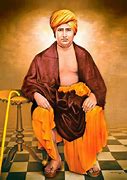Description
Swami Dayananda Saraswati (1824–1883) was an influential Hindu religious leader, scholar, and social reformer in India. He was the founder of the Arya Samaj, a Hindu reform movement that sought to revive Vedic traditions and eliminate practices that he saw as corruptions of the original Hindu teachings.
Key Aspects of Swami Dayananda Saraswati's Life and Legacy:
Early Life:
- Birth and Upbringing: Dayananda Saraswati was born as Mool Shankar Tiwari on February 12, 1824, in Tankara, Gujarat, into a devout Brahmin family. His early life was marked by a deep interest in religious practices and Vedic texts.
- Spiritual Quest: A turning point in his life came when he was 14 years old. Witnessing the death of his younger sister and the lack of solace in idol worship led him to question traditional Hindu practices. This experience set him on a spiritual quest that culminated in his renunciation of worldly life and his pursuit of truth.
Philosophy and Teachings:
- Vedic Authority: Dayananda believed that the Vedas were the infallible authority on spiritual and moral matters. He advocated for a return to the Vedic way of life, rejecting idol worship, rituals, and practices that he deemed superstitious or corrupt.
- Critique of Orthodoxy: He was critical of the prevailing religious practices of his time, including caste discrimination, untouchability, and the oppression of women. He emphasized universal education, the study of the Vedas, and the importance of truth and non-violence.
Arya Samaj:
- Founding of Arya Samaj: In 1875, Dayananda Saraswati founded the Arya Samaj in Bombay. The movement aimed to reform Hindu society by eliminating social evils and promoting the values of the Vedas. Arya Samaj played a crucial role in the promotion of education, especially for women, and in the fight against untouchability.
- Impact on Indian Society: The Arya Samaj also contributed to the nationalist movement in India by fostering a sense of pride in Hindu identity and resisting colonial and missionary influences.
Literary Contributions:
- Satyarth Prakash (The Light of Truth): One of his most significant works, Satyarth Prakash, outlines his vision of Hinduism based on the Vedas. It critiques various religious practices and sets forth his ideas for social and religious reform.
Legacy:
- Influence on Indian Reform Movements: Swami Dayananda’s ideas influenced many leaders in the Indian independence movement, including Mahatma Gandhi. His emphasis on education, social equality, and religious reform has left a lasting impact on Indian society.
- Continuing Influence: The Arya Samaj continues to be active in various parts of India and around the world, promoting Vedic teachings, education, and social reform.
Swami Dayananda Saraswati is remembered as a pioneering reformer who sought to purify and revitalize Hinduism, emphasizing a rational approach to religion based on the Vedas. His work remains influential in both religious and social contexts in modern India.
